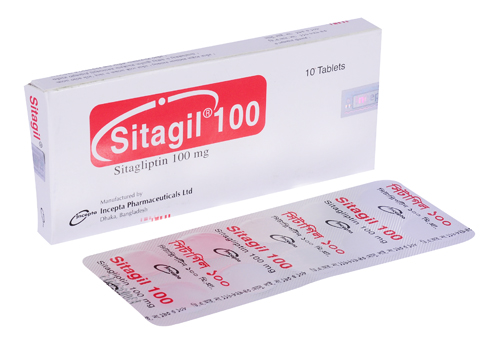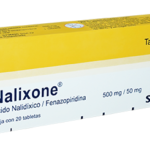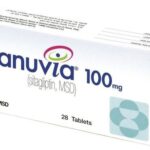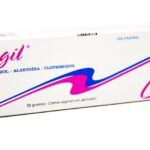Sitagil 100: Uses, Side Effects Interactions, Warnings

Sitagil 100 is a brand of Sitagliptin ( a generic Januvia), a dipeptidyl peptidase-4 (DPP-4) inhibitor, which exerts its action by slowing the inactivation of incretin hormones. Incretin hormones, including glucagon-like peptide-1(GLP-1) and glucose-dependent insulinotropic polypeptide (GIP), are released by the intestine throughout the day and levels are increased in response to a meal. These hormones are rapidly inactivated by the enzyme, DPP-4.
The incretins are part of an endogenous system involved in the physiologic regulation of glucose homeostasis. When blood glucose concentrations are normal or elevated, GLP-1 and GIP increase insulin synthesis and release from pancreatic beta cells by intracellular signaling pathways involving cyclic AMP. GLP-1 also lowers glucagon secretion from pancreatic alpha cells, leading to reduced hepatic glucose production.
What is Sitagil 100 used for?
Sitagil 100 is used along with diet and exercise and sometimes with other medications to lower blood sugar levels in adults with type 2 diabetes (condition in which blood sugar is too high because the body does not produce or use insulin normally). Sitagliptin is in a class of medications called dipeptidyl peptidase-4 (DPP-4) inhibitors. It works by increasing the amounts of certain natural substances that lower blood sugar when it is high. Sitagliptin is not used to treat type 1 diabetes (condition in which the body does not produce insulin and therefore cannot control the amount of sugar in the blood).
Over time, people who have diabetes and high blood sugar can develop serious or life-threatening complications, including heart disease, stroke, kidney problems, nerve damage, and eye problems. Taking medication(s), making lifestyle changes (e.g., diet, exercise, quitting smoking), and regularly checking your blood sugar may help to manage your diabetes and improve your health. This therapy may also decrease your chances of having a heart attack, stroke, or other diabetes-related complications such as kidney failure, nerve damage (numb, cold legs or feet; decreased sexual ability in men and women), eye problems, including changes or loss of vision, or gum disease. Your doctor and other healthcare providers will talk to you about the best way to manage your diabetes.
Dosage & Administration
The recommended dose of Sitagliptin is 100 mg once daily. Sitagliptin can be taken with or without food.
For patients with mild renal insufficiency ( creatinine clearance [CrCl]>50ml/min), no dosage adjustment is required.
For patients with moderate renal insufficiency ( CrCl.>30 to <50 ml/min women), the dose of Sitagliptin is 50 mg once daily.
For patients with severe renal insufficiency (CrCl<30 ml/min) or with end-stage renal disease (ESRD) requiring hemodialysis or peritoneal dialysis, the dose of Sitagliptin is 25 mg once daily.
Pediatric Use: Safety and effectiveness of Sitagliptin in pediatric patients under 18 years of age have not been established.
Geriatric Use: No overall differences in safety or effectiveness were observed between subjects over 65 years. The drug is excreted by the kidney. Because elderly patients are more likely to have decreased renal function, care should be taken in dose selection in the elderly.
What side effects can Sitagil 100 cause?
Sitagil 100 may cause side effects. Tell your doctor if any of these symptoms are severe or do not go away:
• stuffed or runny nose
• sore throat
• headache
• diarrhea
• nausea
Some side effects can be serious. If you experience any of these symptoms, stop taking sitagliptin and call your doctor immediately:
• fever, nausea, vomiting, loss of appetite, ongoing pain that begins in the upper left or middle of the stomach but may spread to the back
• shortness of breath, rapid weight gain, or swelling of feet or ankles
• itchy skin, skin blistering or peeling
• joint pain
• rash
• hives
• swelling of the face, lips, tongue, and throat
• difficulty in breathing or swallowing
Sitagliptin may cause other side effects. Call your doctor if you have any unusual problems while taking this medication.
Sitagil 100 Medication Safety
Dosage adjustment is recommended in patients with moderate or severe renal insufficiency and in patients with ESRD.
When used with a sulfonylurea, a lower dose of sulfonylurea may be required to reduce the risk of hypoglycemia.
Use in Pregnancy & Lactation
Pregnanacy: Safety in pregnant women has not been established. Sitagliptin should be used during pregnancy only if the potential benefit justifies the potential risk of the fetus.
Nursing mothers: It is not known whether Sitagliptin is secreted in human milk, it should not be administered to a breast feeding woman.
Drug Interaction
There was a slight increase in the area under the curve and mean peak drug concentration of Digoxin with the co-administration of 100 mg Sitagliptin for 10 days.
Over Dose
In the event of an overdose, it is reasonable to employ the usual supportivemeasures as dictated by the patient’s clinical status. Sitagliptin is modestly dialyzable. Prolonged hemodialysis may be considered if clinically appropriate.





